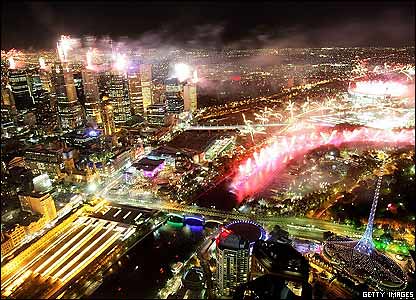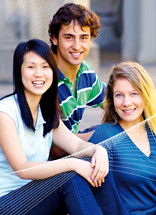Cash Cows in Australia
 That's us. The international students.
That's us. The international students.
Each year thousands of international students throng to Melbourne with the aspiration for a better, world-class education. We come from Malaysia, Singapore, Hong Kong, China, Indonesia, Brunei, Taiwan, Botswana, India, Ghana, among other countries. We stay here, study here, walk on the same street as the locals, study the same thing as Australians, and we adorn the Chinatown. Everywhere in Melbourne, that's where we are.
International students, or students who come from overseas, have a common trait. We are either freaking rich or very lucky. It's not hard to understand why, as they are just a few possibilities:
- If you hail from developed countries, you wouldn't bother to come to Australia because there are good universities right on your door step. Or within two hours journey from your home. And you are actually in a dilemma whether to choose between the one that's one hour away from home and the one fifty minutes away. Who bothers to go to that Howards land?
- If you are from the developing countries, in particular South East Asia, the currency exchange rate is so high that your parents need to be a millionaire to be able to afford your education here. Oh probably not millionaire, but your moderately-rich dad and mum need to sell at least a few properties and/or take some loans to fly you down here. And deep inside, they pray that you will repay their kindness when they are at their twilight years.
- Or you got lucky - you got a scholarship.
Take me for example: I'm studying a six-year medicine course in Melbourne Uni, and I'm paying something like 280 thousand dollars (equivalent to 785 thousand Ringgit) for the tuition fee. The locals pay something like 40 thousand dollars - that's like what I need to pay for one year, and what an average Australian earn in one year.
Things are not helped with the public transport. While the local students happily pay concession price which is like half the amount of full fare; we international students need to pay the full fare every time we travel. It's as if they feel the compulsion to squeeze as much money from us rich brats, with the assumption that international students here are by definition rich brats, which isn't always the case. It sometimes seems as if they never earn enough money from us.
While we are obligingly paying that much of money, when the inspectors are checking tickets, they almost always check the international-looking people first. A-L-W-A-Y-S. Yes admittedly a lot of international students do evade fare for transport; but the way these people cast their sceptical look upon us is ugly. There was once Xuan Ni and I were taking a tram home from the market, and we didn't validate our ticket on the tram since our two-hourly tickets were still valid. Halfway through the journey, a nosey, old local woman came to us and asked us to show her our tickets. We were quite taken aback so we didn't say anything at all (and we didn't show her our tickets too); but on hindsight, we should have just told her off to mind her own business. She didn't even have the right to see our tickets, and her judgmental attitude leaves much to be desired.

So, having experienced all that, one can't help but to wonder, why are we here? Are we, the rich brats, merely cash cows to milk from, to fuel this country's development at the expense of our home countries' brain drain? I remember one year ago, while yours truly was agape watching the Commonwealth Games fireworks explode in Melbourne's night sky, a thought dawned upon me: how many of those fireworks were bought with our money?
To begin with, let me first make something clear: it's unfair to simply accuse Australia as a bad country which is greedy beyond imagination; and I don't mean that at all. It's understandable that a country needs to attract talents from other countries in order to drive its economy, and Australia is precisely doing this. Nevertheless, while I could objectively empathize their policy, I could only imagine: what do the locals think about us? What's in their minds when they see Asians and Africans making up half the crowd in the city, joyously eating chocolate waffles in their favourite chocolate boutique? Are we welcome? Or are we a necessary menace to fill the tank of their developmental engine? And seriously, how much are we treasured, or I venture to say, considered, as a part of the multi-cultural Australian community?
It's a hard question. It's especially hard to talk about community participation, when not many of us really assimilate in the local culture and people. According to a recent The Age article called "Foreign students live a sadly separate life", we, international students as a whole, are a group of marginalised population living in our own community.
The students are effectively segregated from their local peers and the community from the day they arrive. Many do separate bridging courses and orientation programs, and their numbers are concentrated in particular courses, often tailored to their needs, with few local classmates. Such is the social and educational segregation that surveys have found students said they had rarely visited a local person's homeI have to openly admit that I'm one of them. Yes I actually visited a few locals' homes, but they are either an Australian PR from Malaysia (Ka Lip), or people whom I tutor. I have never really gone to an Australian friend's house, as a friend.
 Since the day I arrived in Melbourne, I have had stable groups of friends which consist of mainly Malaysians and some Singaporeans. In particular, I tend to spend time with friends who came from the same college as mine back in Malaysia. Yes I do know Australians, I talk to them sometimes, and we say hi when we meet each other; but I have never really gotten close to any of them. There is my part to blame, certainly, I'm not sociable and all that; but international students generally are indeed segregated from the locals. From The Age's "There's small and then there's small, says tenant":
Since the day I arrived in Melbourne, I have had stable groups of friends which consist of mainly Malaysians and some Singaporeans. In particular, I tend to spend time with friends who came from the same college as mine back in Malaysia. Yes I do know Australians, I talk to them sometimes, and we say hi when we meet each other; but I have never really gotten close to any of them. There is my part to blame, certainly, I'm not sociable and all that; but international students generally are indeed segregated from the locals. From The Age's "There's small and then there's small, says tenant":There's definitely a cultural barrier - it hasn't been broken yet after so many years. There are not many chances for interaction," she said.So most of us are all by ourselves, apparently. And cultural challenge is not the end of our issues. International students in Melbourne are geographically challenged. No I don't mean that we don't know where Brazil is; what I mean is, a lot of us live in quite pathetic places.
"It has somehow got to a stage where we can't be bothered anymore - it's not that we're not willing to try but it's just so segregated it's too hard to break through. When you have your stable friend network you just don't look.
A typical international student's apartment room is like this: a two-hundred square-feet room, a small desk holding up a little laptop, shirts and socks strewn about on the floor, a little bookshelve, a couple of chairs, and a squeaky single bed with crackling bed frames. Of course not everyone's that bad, but that's how many people's rooms look like. It's usually crampy, heaty in summer, freezing in winter, and the worst thing of all - grossly expensive. When we first came to Australia, a lot of us had our houses conveniently arranged by our agents. Most of those high-rise apartments are located within 10 minutes' walk from the uni, and as I had testified quite a few times in the past, many of them are made of plywoods.
Of course I can't complain much, because I know that many counterparts of mine, back in Malaysia and in other countries, are living in worse condition. But the problem I'm highlighting here is, we, the international students in Melbourne, are happily becoming the local housing industries' source of cash - and in the process we don't gain much out of the exorbitant fees we pay. According to The Age's "Foreign students living on the edge of society":
Over the past seven years, 31 apartment blocks sprang up in the area, many on Swanston Street, creating a spine of high rises between RMIT and Melbourne University. Nearly 10,000 students live in them. Almost none are Australians.
"There is a process of segregation going on here that seems to us to be utterly avoidable," Dr Shaw said.
"We're finding these international students isolated in this housing that's being aggressively marketed in South-East Asia by the housing providers."
Most apartments are small and among the most expensive real estate in Melbourne... They are being stereotyped as ghettos.Haha I should stop painting too much of a stark picture about life as an international student. From reading what I said above, if you got the impression that being an international student is pitiful, I apologize for having misguided you. The reality is just the opposite. I must say that most international students including myself enjoyed our lives tremendously. My only concern is that amongst all the joy and quality education that we enjoy, at the end of the day we are just a marginalised community in the actual society, a league of our own.
Am I thinking too much? So what if I'm a cash cow, right? :P I shall go back to my studies now. It's expensive to be a cash cow, in any case.
Recommended reading: The Age articles I linked to above, Metroblogging Melbourne.
Image credit: BBC News, Melbourne University, Cash Cow Clinic.







8 comments:
You make some good points in a well written manner. I think you should present your point of view this Thursday.
The Place of Students in Central Melbourne: Cash Cows or Community Members?
Date: 10th May 2007
Time: 6pm-8pm
Venue: Supper Room, Melbourne Town Hall, Swanston St, Melbourne
The girl in "The Age" article is Janice by the way, who writes for Metroblogging Melbourne.
Check out her post on Cash Cows or community members.
You mean there's a bit of kulit-fication in Melbourne? But yeah, I've heard for quite some times that some ang mohs just look down on us because... well, we're us. Why, huh? Aren't their own citizens richer than us?
As for your case, I think things are harder for you because as you said, you are not quite sociable. Ever tried opening up? It might work... ;)
Neil: Hi, thanks for visiting my blog and leaving a comment! Yeah I did read about that in Metroblogging Melbourne, in fact that's the first place I came across the discussion. Should have linked to that post in my blog.
day-dreamer: Eerm, kulitfication... Not as serious as Malaysia, I must say; but it's indeed true that the disparate treatment between locals and international students can be felt, especially in the case of transport and uni fees. It's been a bit of complaint in Malaysian Education blog too, about how Australian universities today are perceived to be over-rated institutions which are all out to earn some quick money from rich south-east-asians.
Haha, as I said, things are not hard for me la. A circle is a circle, and it takes time to break in. It's just like, even among Malaysians, there are a few circles of friends, and once the stable cliques are formed, you wouldn't easily go into another clique. Yes you would say "hi" and "bye", and a word or two, but you wouldn't easily become a close friend to a person from another clique.
Neil: Oh ya how did you find my post? Did you just monitor the word "cash cow" using google blog search or technorati? :P
I will consider going to that forum, by the way. :)
haha, yeah I'm constantly monitoring cash cows.
No, actually, I monitor the Technorati feed with keyword "Melbourne".
Chang Yang, such phenomena happen in all places. Seriously, this is much more worse in Malaysia. And even in Malaysia, we have prejudice towards certain foreign immigrants. We are bias. They are labeled as "orang asing," like how the US labels foreigners as "aliens."
The difference is - people are somehow less "articulate" (not literally) in Malaysia, if you get what I mean.
yeah international students live a separate life, but does ma matter?
no! cuz we are waay cooler! wee!
how you been lately :D
Neil: Ahh, I see.. Haha...
Eric fu: Yeahh the word "alien" sounded so disparaging the first time I heard it.
Alvin ooi: Cool we are!
Post a Comment